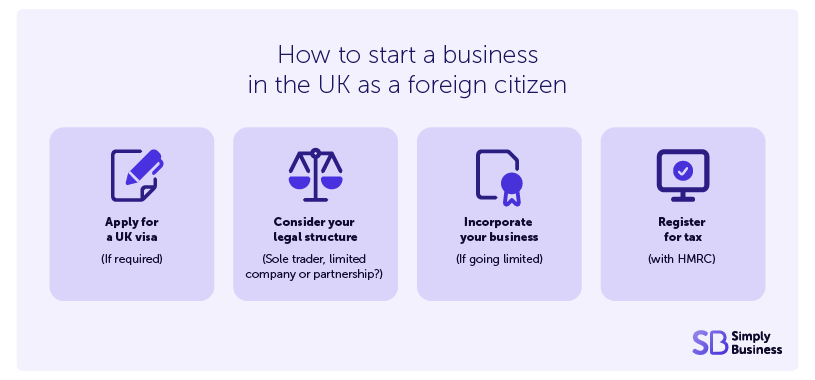The UK is a great place to start a business. But if you’re a foreign national you’ll need a UK business visa to launch your company.
There are specific visas available for foreign nationals who want to start a UK business. And while EU citizens were previously free to live and work in the UK without a visa, Brexit means that they’re now subject to the same rules as non-EU citizens.
There are several other steps you need to take to start a business in the UK. Read our full guide to find out more.
How to start a business in the UK as a foreign citizen
You can get going with the following steps:
- Think about whether you need a UK visa. EU nationals who were living in the UK before 1 January 2021 may have been able to apply for the EU Settlement Scheme (although the deadline has passed for most people). Most foreign nationals will need to apply for a work visa before they can set up a business. You can read more information on visas below.
- Apply for the correct visa if required. If you do need a visa, you should apply ahead of time. Visas for entrepreneurs include the Innovator Founder visa.
- Consider your business’s legal structure. Once you’re legally allowed to start a business in the UK as a foreign national, you can actually get going. If you already know what your business will do, your first step is to decide on a legal structure. Read more about choosing a legal structure for your business.
- If you’re setting up a limited company, you need to incorporate your business. This involves registering with Companies House.
- Get up to speed on your tax obligations. You need to register for corporation tax if you’re incorporated, and whatever your structure, self-employed people need to register as a Self Assessment taxpayer with HMRC.
Can you start a business as an international student?
If you’re studying in the UK on a Tier 4 Student visa, you’re not eligible to start a business while studying. However there’s nothing to stop you developing your idea alongside your studies and taking advantage of the resources available at your university or college.
Browse our popular business ideas for students guide for inspiration.
What if EU citizens want to start a UK business?
Since Brexit, people from the EU, Switzerland, Norway, Iceland, or Liechtenstein who want to start a business in the UK have to apply for a visa like non-EU citizens.
The exception is if you or a close family member started living in the UK before 1 January 2021 and successfully applied for the EU Settlement Scheme by June 2021.

What are investor, business development and talent visas?
Foreign nationals can’t apply for the Tier 1 (Entrepreneur) visa anymore, as it’s been replaced by the Innovator Founder Visa.
You’ll usually get a decision on your visa within three weeks, if you’re applying from outside the UK.
Innovator Founder visa
This visa is for those who want to start an innovative business in the UK. The business needs to be different to anything else on the market, and an approved body has to endorse your idea.
Eligibility criteria
You must:
- have your business idea assessed by an endorsing body
- have enough personal savings to support yourself while you’re in the UK
- have at least £1,270 in your bank account for 28 consecutive days before you apply for, extend, or switch to this visa
- meet the English language requirements – you need to be able to speak, read and write English to to level B2 on the Common European Framework of Reference for Languages (CEFR) scale
There’s a big fee to apply for the visa, too – it’s £1,036 (£1,292 if you’re extending or switching), although the fee also depends on where you apply from.
You can stay in the UK for three years on an Innovator Founder Visa and there’s no limit to the number of extensions.
Always check the UK government website for the latest information on the Innovator Founder Visa.
Start-up visa (closed)
The Start-up Visa closed to new applications in April 2023.
This visa was similar to the Innovator Founder visa in that you needed to have an innovative business idea that was different to anything else on the market.
If you already have a Start-up visa, you still have a few options. You can:
- apply for your partner and children to join you in the UK.
- potentially switch to an Innovator Founder visa if your current visa is ending and you want to stay in the UK for business
You can find out more about doing this on the government website.
Global Talent visa
You can apply for a Global Talent visa if you’re a leader, or potential leader, in:
- academia or research
- arts and culture
- digital technology
Your application has to be endorsed by a relevant authority with expertise in your field. While the Home Office handles this for you, how you apply depends on your field.
People on a Global Talent visa can be self-employed or directors of companies and can live and work in the UK for up to five years at a time.
Tier 1 (Entrepreneur) visa
This is no longer available, although those currently in the UK with this visa can apply to extend theirs.
You’ll need to be eligible and fulfil certain criteria to extend your visa. You should:
- have invested at least £200,000 in a UK business (excluding any commercial property or director’s loan), or £50,000 if your initial application was based on having funds from an approved funding source
- have registered as a director or as self-employed no more than six months after you were given permission to stay in the UK under the original visa
- prove you’ve been self-employed, a member of a partnership or working as a director of a business three months before you apply
- have created at least two full-time jobs that have existed for at least 12 months
Read more about the Tier 1 (Entrepreneur) visa on the UK government website.
Can you start a business on a skilled worker visa?
Technically you could start a side hustle on a skilled worker visa. You’re allowed to work up to 20 hours a week in another job or for your own business.
It’s vital that you’re still able to do the job that you’re sponsored for, though. Find out the full details on the UK government website.
Advice for foreign nationals starting a UK business
Remember that there are wide-ranging regulations on living and working in the UK as a foreign national.
Immigration laws are strictly enforced, so make sure you keep yourself updated. You should get professional legal and financial advice if you’re not sure about anything.
More small business guides
- How to write a business plan – a step-by-step guide for new companies
- How to do a self-employed tax return
- Payment on account: what it is and how to pay
- What is business insurance?
Are you going to start a business in the UK as a foreign national? Let us know in the comments below.
Ready to set up your cover?
As one of the UK’s biggest business insurance providers, we specialise in public liability insurance and protect more trades than anybody else. Why not take a look now and build a quick, tailored quote?
